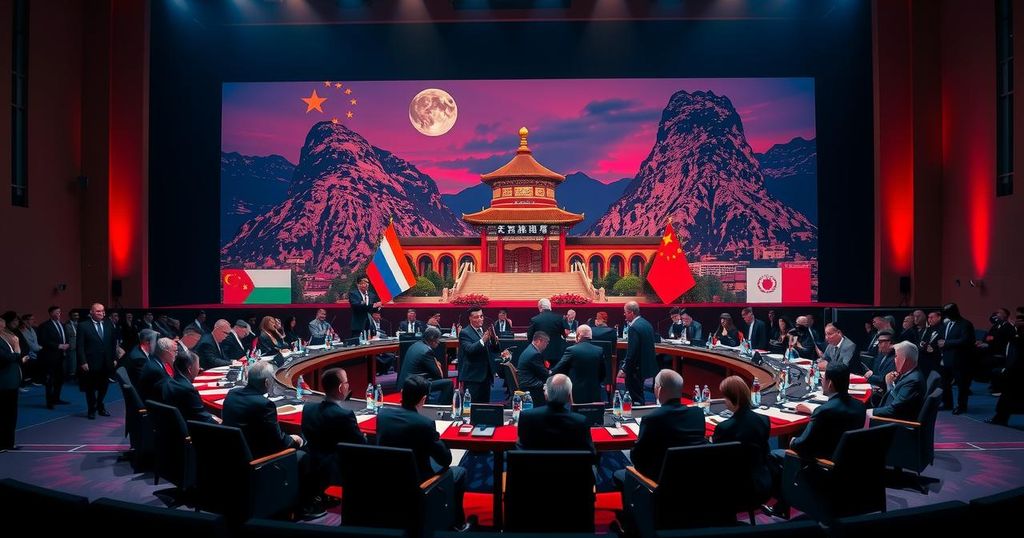During the Asia-Pacific Economic Cooperation Forum, President Biden’s presence was overshadowed by President Xi Jinping’s prominence. Xi’s initiatives in Peru, including significant investments in infrastructure, showcase China’s growing influence in Latin America, raising concerns over U.S. political standing. Biden’s administration is urged to strengthen ties with Latin America amidst a backdrop of Peru’s controversial leadership and China’s expansionist strategies.
At the recent Asia-Pacific Economic Cooperation Forum, President Joe Biden found himself sidelined as China, represented by President Xi Jinping, took center stage. This significant event underscored the shifting dynamics within the region, formerly viewed as America’s sphere of influence. Mr. Biden’s appearance at the summit, during his inaugural visit to South America, felt secondary, as the China-centric agenda dominated the proceedings. Xi Jinping capitalized on China’s enduring historical ties with Peru during his visit, exemplified by the investment of £2.6 billion in a new mega-port led by the state-owned company Cosco. He expressed admiration for the Peruvian people, highlighting cultural connections while simultaneously engaging in substantial economic diplomacy that has eluded U.S. administrations for years. Through initiatives such as the Belt and Road, China has invested approximately $286 billion in Latin American infrastructure projects. Following a brief meeting, Xi characterized Sino-American relations as the “most important” on the globe, advocating for cooperation over conflict. His planned diplomatic engagements across Latin America, including revitalizing trade agreements and inaugurating significant infrastructure projects, further illustrate China’s strategic interests in the region. The U.S. is apprehensive that China’s expanding influence may extend to establishing military footholds proximate to U.S. borders. The Biden administration, grappling with criticism for its lack of strategic economic engagement in Latin America, may need to reassess its approach. Eric Farnsworth of the Council of the Americas suggests that China’s competitive edge stems not only from open trade practices but also from substantial investments in infrastructure, which garner prestige for local governments. Moreover, Biden’s strategic decisions may be influenced by the controversial nature of Peru’s leadership under Dina Boluarte, whose administration faces accusations of corruption and democratic degradation. This backdrop complicates U.S. diplomatic relations, stressing the importance for the Biden administration to reaffirm its commitment to democratic principles in the region.
The Asia-Pacific Economic Cooperation (APEC) Forum serves as a platform for international leaders to engage in discussions on economic issues pertinent to the Asia-Pacific region. The latest summit highlighted the growing influence of China and President Xi Jinping, accentuating a shift in power dynamics that has largely sidelined U.S. President Joe Biden. Historically, the U.S. has maintained a stronghold in the Western Hemisphere, but China’s multifaceted investments and diplomatic maneuvers have become increasingly prominent, reshaping perceptions and relationships within Latin America. The Belt and Road Initiative is a cornerstone of China’s strategy to enhance its economic footprint in the region, significantly impacting infrastructure and trade. Presently, the U.S. faces challenges in countering China’s advances, particularly as it seeks to uphold its interests and values while fostering relationships within a geopolitical landscape that is rapidly evolving towards multipolarity.
The recent APEC summit has underscored a significant shift in geopolitical power dynamics, particularly reflecting China’s rising influence at the expense of U.S. prominence. President Biden’s marginalization during a key diplomatic event epitomizes the urgent need for a strategic recalibration in U.S.-Latin America relations. The growing investments and alliances fostered by China highlight competitive advantages that the U.S. must address, particularly in promoting democratic governance and economic collaboration in the region. The U.S. administration’s approach to engagement with Latin America will be crucial as it navigates these challenges and redefines its role on the global stage.
Original Source: www.telegraph.co.uk






